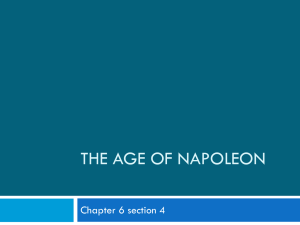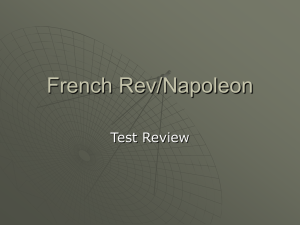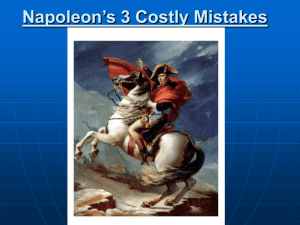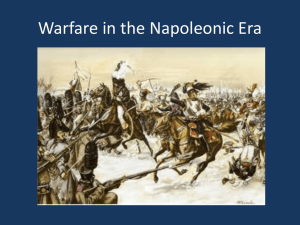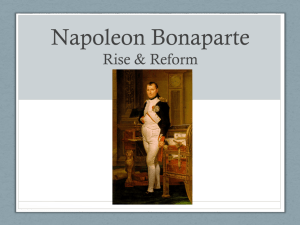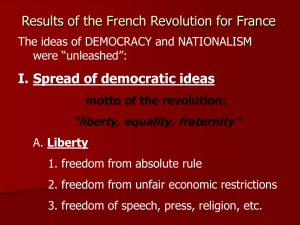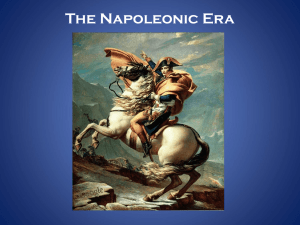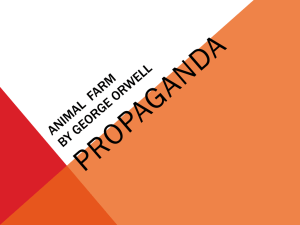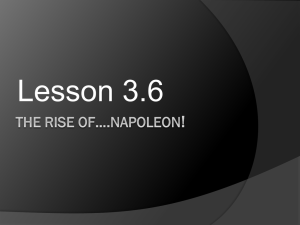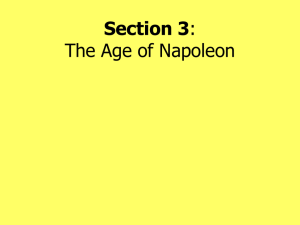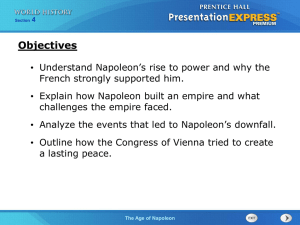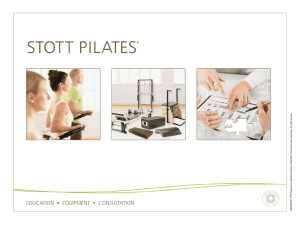Napoleon - West Shore Community College
advertisement
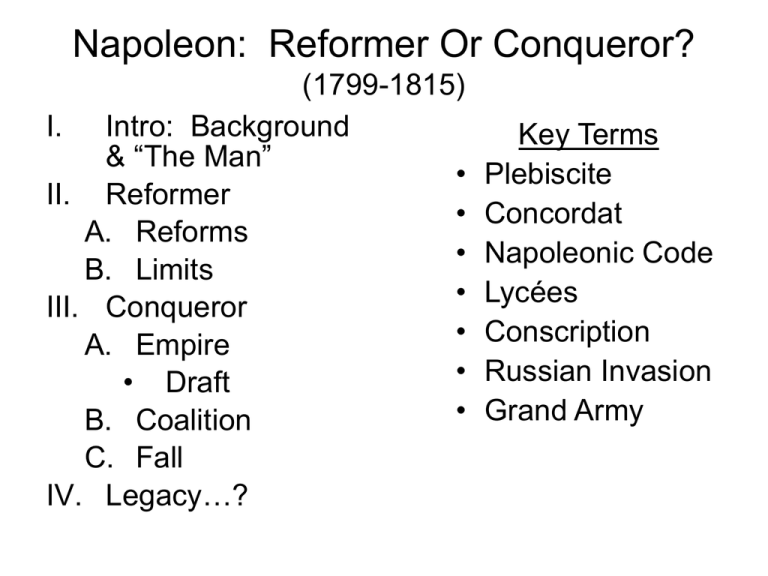
Napoleon: Reformer Or Conqueror? (1799-1815) I. Intro: Background & “The Man” • II. Reformer • A. Reforms • B. Limits • III. Conqueror • A. Empire • • Draft • B. Coalition C. Fall IV. Legacy…? Key Terms Plebiscite Concordat Napoleonic Code Lycées Conscription Russian Invasion Grand Army Announcements: Extra Credit • Friday 3/5 at 7:30: Otis Murphy (Classical Saxophonist) at Ludington Center for the Arts • Gypsy: March 12, 13; 19, 20 at 7:30; March 14 & 21 at 2:00 at Manistee’s Ramsdell Theater • WSCC students will be admitted free if they make reservations at the WSCC Box Office M-F 8-12:00 or leave a message at 843-5507 • To do: Attend the event & write a summary (one page, single-spaced, typed, 350 word) • Up to five points can be added to discussion grade Plebiscite (Napoleon’s Use of “Democracy”) A direct vote by the people on a specific issue. 1. Napoleon overthrew the Government (1799) • 3,000,000 Approved • 3,000 Disapproved 2. Napoleon was named Emperor (1804) • 3,500,000 Approved • 2,600 Disapproved He used rhetoric of Revolution to “legitimize” his actions, but gave people very little choice. Concordat (Between Napoleon & Pope in 1801) Pope Pius VII 1. France reverted back to “old” calendar. 2. Catholicism was the “preferred religion” of France. 3. Catholic Church could control primary education. 4. Church leaders had to take loyalty oaths to the government. • This was VERY popular in France. Napoleonic Code (1804) 1. Established equality under the law and abolished privileges based on birth. 2. Individuals may choose their own occupations. 3. Father’s absolute authority over family was restored. French coin minted in honor of the Napoleon’s Code Education Reforms • Local churches controlled primary education: open to boys & girls. • Established Lycées (high schools): public education system to train public servants. • Established university of France Limits To Reforms 1. No Freedom of the Press (only four statecontrolled newspapers in Paris by 1811). 2. Political opposition was crushed. • Secret Police French Empire 1. Napoleon’s Goal: • Control all of Europe • Paris = Capital • Society based on Napoleonic Code 2. How to pay…? • Sold Louisiana to US for $15,000,000 3. Successes… • Skilled leader • Conscription/Draft Conscription/Draft (Permanent Service Was Expected) 1. Each community was required to provide a “quota” of soldiers to fight. 2. A Draft Lottery was conducted. 3. Those “drafted” had to serve or hire a substitute. • Demonstrates Napoleon’s TOTAL POWER! Coalition Against France • A coalition was formed to fight France – Great Britain, Prussia, Austria & Russia— Spain Russian Invasion (1812) 1. Napoleon gathered his “Grand Army” – 600,000 troops vs. 160,000 Russians 2. France successfully attacked in July; Russians retreated (scorched-earth policy). 3. French occupied Moscow, but were overextended & retreated; only 100,000 Grand Army troops remained. • MAJOR mistake & led to his downfall! Assumption Cathedral-1479 (Where Tsars were crowned; Napoleon kept horses here) Impact of Napoleonic Invasion • 1812 Memorial Arch recognizes the defeat of Napoleon. Napoleon’s Fall • France was invaded & defeated in 1814. • He returned for “100 Days” in 1815. • He died in 1821 on the Island of St. Helena. Napoleon’s Legacy 1. His reforms created opportunity for millions. 2. France was devastated physically & economically; hundreds of thousands died. 3. Influenced modern leaders: • Used military force to gain power and backed it up with rhetoric of Revolution. Overall, was his legacy positive or negative for the people of France? Napoleon: Reformer Or Conqueror? (1799-1815) I. Intro: Background & “The Man” • II. Reformer • A. Reforms • B. Limits • III. Conqueror • A. Empire • • Draft • B. Coalition C. Fall IV. Legacy…? Key Terms Plebiscite Concordat Napoleonic Code Lycées Conscription Russian Invasion Grand Army
